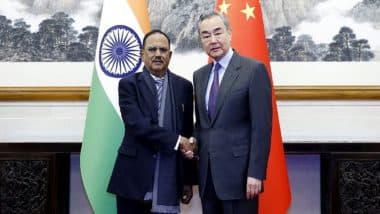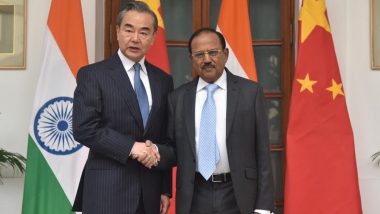Beijing, May 23 (PTI) China is preparing to set up national security agencies in Hong Kong to deal with pro-democracy agitators, the state media reported on Saturday, a day after Beijing introduced a controversial national security law to firm up control over the former British colony.
Currently, a Chinese Military garrison comprising over 10,000 troops -- mainly a symbolic presence for external defence -- is stationed in Hong Kong. The public order is maintained by the Hong Kong Special Administrative Region (HKSAR) government.
The draft bill on establishing and improving the legal system and enforcement mechanisms for the Hong Kong Special Administrative Region (HKSAR) to safeguard national security was submitted to the National People's Congress (NPC) during its week-long session here and is expected to be passed on May 28.
The bill is a political bombshell for the former British colony as China has decided to bypass the local legislative council to bring about a new national security law, tailor-made to control Hong Kong after the pro-Beijing local administration headed by Chief Executive Carrie Lam failed to control months of mass protests by pro-democracy groups demanding autonomy and freedom from China.
Also Read | US Navy Successfully Tests Laser Weapon That Can Destroy Aircraft Mid-flight (Watch Video).
The Chinese central government is preparing to set up national security agencies in Hong Kong to enhance information collection and evidence-based dealing against acts of 'splitting the country, subverting state power, organising and perpetrating terrorist activities' as it accelerated efforts to formulate the national security legislation, state-run Global Times reported on Saturday.
"As far as I know, the legislation is ready, which will be passed in the next meeting of the NPC Standing Committee," Kennedy Wong Ying-ho, a member of the National Committee of Chinese People's Political Consultative Conference (CPPCC) and solicitor in the Supreme Court of Hong Kong, told the tabloid.
The bill was moved in the NPC by the government which was denounced by pro-democracy parties as a death knell for Hong Kong's autonomy.
After the lawmakers vote on the draft Hong Kong National Security Law on May 28, the NPC Standing Committee can hold interim meetings to sign the bill into law, Wong said.
The Standing Committee refers to a small group of powerful legislators who meet round-the-year. The near 3,000-member NPC, regarded as a rubber-stamp Parliament for routine approvals of the ruling Communist Party's decisions, holds a full session only ones a year.
"National security matters are tackled in a highly professional scope, and ordinary police officers or government officials do not have specific means, for example, investigation measures," Wong said, noting that the central government's special agencies to safeguard national security are likely to set up branches in Hong Kong.
Lam, whose Extradition Bill in the local assembly sparked seven months of massive protests, defended the new draft legislation tabled in the NPC.
Hong Kong was rocked by unprecedented, pro-democracy protests last year which began over the proposed extradition law, which sparked fears that locals would be prosecuted in the Chinese mainland.
It later turned into a major pro-democracy movement with demands to elect local officials without Chinese interference.
Lam told the media in Hong Kong that business confidence in the former British colony will improve as the place will be safer after its legal system and enforcement mechanisms to safeguard national security are established and improved.
The new legislation will not damage the interests of foreign investors, state-run Xinhua news agency reported.
Lam said national security is the top priority of every country and region, which is the foundation for the citizens' well-being.
Student activist and politician Joshua Wong, who emerged as a new leader of the student and youth protests in Hong Kong, tweeted that the move was an attempt by Beijing to "silence Hong Kongers' critical voices with force and fear".
Democratic Party leader Wu Chi-wai said the announcement was the death of "one country, two systems".
Civic Party lawmaker Dennis Kwok said, "If this move takes place, 'one country, two systems' will be officially erased. This is the end of Hong Kong."
While the Chinese official media defended the move as a necessary step to control the pro-democracy agitation, Hong Kong media said it could create more divisions and antagonism.
"In addition to enhancing the legal system and enforcement mechanism as well as requiring the chief executive to submit regular relevant reports, the new law also provides for the establishment of a national security organisation in the city by the relevant central government agency," the Hong Kong-based South China Morning Post said in its editorial.
“Whatever form it takes, it is important the national security law addresses concerns over possible curbs on freedoms and rights," it said.
(This is an unedited and auto-generated story from Syndicated News feed, LatestLY Staff may not have modified or edited the content body)













 Quickly
Quickly




















